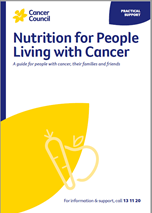- Home
- About Cancer
- Living well
- Nutrition and cancer
- Nutrition and advanced cancer
Nutrition and advanced cancer
Improve your quality of life with advanced cancer through proper nutrition. Learn about managing symptoms, weight loss, and malnutrition.
Learn more about:
- Overview
- Nausea and vomiting
- Mouth problems
- Blockage in the bowel
- Cachexia
- Use of medicinal cannabis
Overview
If cancer spreads from where it started to other areas of the body (secondary or metastatic cancer), problems with eating and drinking may occur or get worse. It’s common for people with advanced cancer to lose their appetite. This often leads to weight loss and malnutrition. Controlling symptoms that affect your ability to eat or drink will help improve your quality of life. Soft foods and clear liquids may be easier to digest. It’s okay to focus on eating foods you enjoy.
For more on this, see Living with advanced cancer.
Nausea and vomiting
Many people with advanced cancer have problems with ongoing nausea and vomiting. Nausea and vomiting may be caused by pain medicines, cancer growth, blockage in the bowel, slower digestion, or high calcium levels in the blood (hypercalcaemia). Feeling tired or anxious may make the nausea worse.
These suggestions may help reduce nausea and vomiting. Ask your doctor about what medicines may help.
Mouth problems
People with advanced cancer may have a dry mouth or a sore mouth and throat. These problems may be caused by drinking less or by some types of treatment. Learn ways to ease a dry mouth. If chewing and swallowing become difficult, it may be necessary to change the texture of your food.
Blockage in the bowel
Cancer, surgery or changes to digestion in or near the abdomen sometimes cause the bowel to become blocked (bowel obstruction). This can also happen if the cancer comes back. Because faeces (stools or poo) cannot pass through the bowel easily, you may have symptoms such as nausea (feeling sick), vomiting, constipation or abdominal discomfort and pain.
To relieve symptoms of a bowel obstruction, you may be given medicines including laxatives and enemas, or have a small tube (stent) put in that helps keep the bowel open. The stent is inserted through the rectum using a flexible tube called an endoscope.
Cachexia
People with advanced solid tumours (e.g. cancer of the lung, pancreas, oesophagus, stomach, liver and bowel) may develop a muscle-wasting syndrome known as cachexia. This means the way the body uses protein, carbohydrates and fats changes, and it can burn up energy faster.
Symptoms include:
- loss of weight, including loss of fat and muscle mass
- feeling sick (nausea)
- feeling full after eating small amounts
- anaemia (low numbers of red blood cells)
- weakness and fatigue
- inflammation in the body (shown on a blood test).
Your doctor or dietitian will discuss the best way to manage cachexia. They may suggest eating more foods high in energy, fat and protein, and taking nutritional supplements, or medicines such as appetite stimulants.
If you continue to have problems maintaining your nutrition, your treatment team may recommend feeding through a tube in the nose (nasogastric or NG tube) or stomach (often known as a PEG or RIG tube). However, each person is different and, depending on your situation, tube feeding may or may not be recommended. Your treatment team will give you more information.
Use of medicinal cannabis
| What is medicinal cannabis? | Medicinal cannabis refers to a range of prescribed products that contain the two main active ingredients, delta-9-tetrahydrocannabinol (THC) and cannabidiol (CBD). THC and CBD are cannabinoids. Other types of cannabinoids include cannabis, which is also known as marijuana, weed, and pot. |
| What are cannabinoids? | Cannabinoids are chemicals that act on certain receptors found on cells in our body, including cells in the central nervous system. |
| Can medicinal cannabis treat cancer? | There is no evidence that medicinal cannabis can treat cancer. |
| When might medicinal cannabis be helpful? | There is some evidence that cannabinoids can help people who have found conventional ways to treat symptoms and side effects unsuccessful, e.g., chemotherapy-induced nausea and vomiting. |
| Effect on appetite and weight | To date, published studies have shown medicinal cannabis to have little effect on appetite and weight. |
| Is cannabis legal in Australia? | Cannabis is an illegal substance in Australia. However, the Australian Government allows seriously ill people to access medicinal cannabis for medical reasons. |
| How can you access medicinal cannabis? | The Therapeutic Goods Administration’s Special Access Scheme allows eligible medical practitioners to apply to import and supply medicinal cannabis products. The laws about access to medicinal cannabis vary between states and territories. These may affect whether you can be prescribed this substance where you live. |
| More information | To find out more, visit tga.gov.au/medicinal-cannabis. |
→ READ MORE: Meal and snack ideas
Podcast: Appetite Loss and Nausea
Listen to more episodes from our podcast for people affected by cancer
Video: Eating well with cancer
More resources
Jacqueline Baker, Senior Oncology Dietitian, Chris O’Brien Lifehouse, NSW; Lauren Atkins, Advanced Accredited Practising Dietitian, OnCore Nutrition, VIC; Dr Tsien Fua, Head and Neck Radiation Oncology Specialist, Peter MacCallum Cancer Centre, VIC; Rosemerry Hodgkin, 13 11 20 Consultant, Cancer Council WA; Clare Hughes, Manager, Nutrition Unit, Cancer Council NSW; John Spurr, Consumer; Emma Vale, Senior Dietitian, GenesisCare, SA; David Wood, Consumer.
View the Cancer Council NSW editorial policy.
View all publications or call 13 11 20 for free printed copies.

